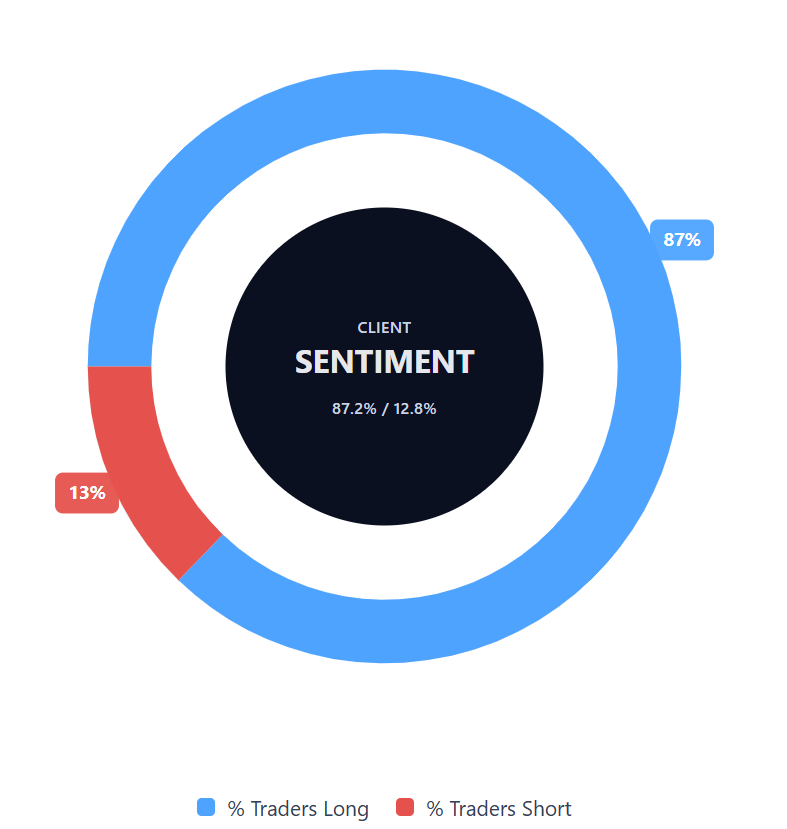Oracle stock forecast 2025-2030: Third-party price target and future outlook
Oracle (ORCL) is trading at $238.60 on 8 September 2025 at 11:59 UTC, just below its intraday high of $239.04 and above the day’s low of $222.91.
Shares advanced as the broader technology sector found support, coinciding with a decline in US Treasury yields (Reuters, 8 September 2025).
The move reflects trading activity where sellers account for 12.78% of CFD volumes, while buyers represent 87.22%. Market liquidity remained steady into the close.
Oracle stock predictions: Analyst price target view
ValueInvesting.io (consensus snapshot)
ValueInvesting.io reports a 12-month average price target of $253.53 for ORCL as of 8 September 2025, with a low of $176.75 and a high of $341.25, based on 47 analyst estimates. Figures are a simple aggregation of sell-side targets updated on a rolling basis.
Investing.com UK (consensus page)
Investing.com UK lists an average 12-month target of $244.77 for ORCL as of 8 September 2025, with a high of $325 and a low of $175, based on 33 analyst predictions.
MarketBeat (consensus tracker)
MarketBeat shows a $232.61 average 12-month target for ORCL as of 8 September 2025, with highs of $325 and lows of $130 across 34 analysts.
MarketWatch (LSEG/FactSet feed)
MarketWatch cites a $249.30 average target for ORCL as of 8 September 2025, with a published range of $175-$325, aggregated from 42 broker estimates.
Takeaway: Price targets span $176-$341, clustering around $225-$260. Analysts highlight AI infrastructure investment, multi-cloud expansion and backlog growth.
Predictions and third-party forecasts are often inaccurate, as they cannot anticipate unexpected market events. Past performance should not be taken as a reliable guide to future outcomes.
ORCL stock forecast: Technical overview
ORCL ($238.60 at 11:59 UTC, 8 September 2025) is trading above its 20-, 50-, 100- and 200-day moving averages (DMAs) at approximately $238, $239, $201, and $183 on the daily chart. Momentum is neutral, with the 14-day RSI around 47. The nearest resistance is the $248.71 pivot; a daily close above this level could bring $271.29 into focus. On pullbacks, initial support is at the $235.91 pivot, followed by the 100-day simple moving average (SMA) near $201. A break below this level could point to lower reference areas.
This analysis is for informational purposes only and does not constitute financial advice or a recommendation to buy or sell any instrument.
Capital.com’s client sentiment for Oracle
Client positioning in Oracle (ORCL) CFDs is weighted towards buying, with 87.2% of positions long and 12.8% short, leaving buyers ahead by 74.4 percentage points (pp) on 8 September 2025. This snapshot reflects open positions on Capital.com and is subject to change.

FAQ
Who owns the most Oracle stock?
As of September 2025, Oracle’s largest shareholders include co-founder Larry Ellison, who holds a significant personal stake, along with institutional investors such as Vanguard Group and BlackRock. These top holders represent a substantial portion of the company’s equity, with ownership split between insiders and funds (TipRanks, 8 September 2025).
Is Oracle a good stock to buy?
Whether Oracle is appropriate for a portfolio depends on individual objectives and risk tolerance. Analyst assessments of the ORCL stock forecast are mixed, noting both opportunities in multi-cloud adoption and challenges from competition in enterprise software. Traders should conduct independent research, review the latest financials, and ensure any exposure fits their strategy and risk management approach.
Could Oracle stock go up or down?
The ORCL stock price can move in response to quarterly results, product demand, and macroeconomic factors such as interest rates. Oracle stock predictions from external sources point to potential upside from AI and cloud infrastructure growth, as well as risks from weaker IT budgets or increased competition. As with any share, movements may be volatile.
Should I invest in Oracle stock?
Investing or trading in Oracle depends on an individual’s strategy and time horizon. Short-term traders may focus on CFD opportunities around earnings or news-related volatility, while longer-term investors could consider structural trends in software and cloud. Contracts for difference (CFDs) are traded on margin, and leverage higher than 1:1 magnifies your potential for both profits and losses. Forecasts remain uncertain, and past performance is not a reliable indicator of future results. Decisions should be based on personal risk tolerance and objectives.